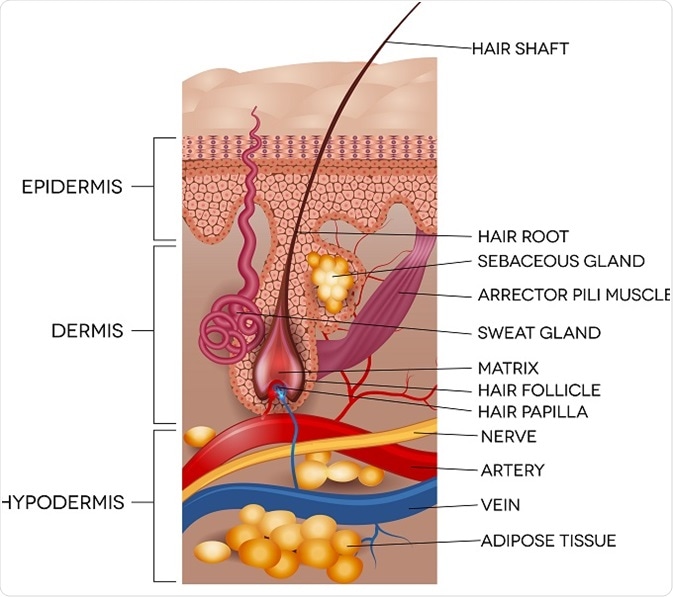For The Latest Medical News, Health News, Research News, COVID-19 News, Pharma News, Glaucoma News, Diabetes News, Herb News, Phytochemical News, Thailand Cannabis News, Cancer News, Doctor News, Thailand Hospital News, Oral Cancer News, Thailand Doctors
Tumors of the hair follicle are called folliculoma or trichofolliculoma. It is a benign and rare tumor seen mainly in the face, but may also present on the neck, scalp, or ears. It affects males more frequently than females. Tumors of the hair follicle are most commonly diagnosed in late teenage years, but in some cases are seen even after age 40 and have also been seen at birth in rare cases.
Folliculoma is a cutaneous adnexal tumor. Clinically, a folliculoma presents as a solitary, tiny, skin-colored nodule on the scalp or face. Often, a cluster of hair protrudes from a distinct center.
The term tumor usually causes concern, though in this case it refers to abnormal growth of tissue and is not serious in the majority of patients. A benign tumor refers to excessive growth that is not abnormal in terms of structure and does not affect healthy tissue like a cancer or malignant tumor does. However, it is always important to get any lump in the skin checked by a physician to rule out malignant growth.

In most cases, folliculomas present as a solitary, whitish or flesh-colored nodule. The lumps are normally about 0.5 inch in diameter and have a central pore, from which tiny hairs may protrude. Common sites in the body where trichofolliculomas are found include scalp, neck, face, ears, and, in rare cases, even the vulva in female patients. A very common site is the around the nose.
Many people mistake hair follicle tumors for a mole, wart, or pimple as there is no associated redness or pain or itching. Affected hair follicles may still appear to go through normal growth phases. Pinching of the lesion may cause inflammation that is localized and this may increase the risk of infection. Indications of an infection include redness, pain, and swelling around the growth, which may interfere with a clear diagnosis.
The exact cause of a hair follicle tumor is not known though it is mostly an abnormal development of the follicles. The nodules are often mistaken for cancerous mass on the skin, such as basal cell carcinoma.
It develops spontaneously, though rarely it is associated with a history of trauma at the lesion site. Research on follicle tumors is limited, but studies say that it is more common in Caucasians. No possible genetic links have been identified.
Consulting a skin specialist or dermatologist is very important for patients who have a suspected hair follicle tumor. Untrained physicians can easily mistake it for other conditions with similar features and health care providers should note that these masses often look similar to other skin lesions. When present, a hair protruding from the central pore is conclusive of diagnosis of folliculoma. Other conditions that look similar to follicle tumor are basal cell carcinoma, milia, and moles. If physical inspection is inadequate to confirm folliculoma, a microscopic inspection can be done. However, it is very important that the mass is identified and confirmed as a folliculoma by a qualified medical professional.
Folliculomas don’t pose any threat to the affected individual as they are benign and cause no symptoms or discomfort. However, patients often seek treatment to remove it due to cosmetic concerns. Medical treatment options such as topical creams or ointments are not effective for this purpose, and the tumor needs to be removed surgically or with laser removal, which is usually successful.
The mass should be removed fully to prevent regrowth of the tumor. Incomplete removal of a folliculoma can lead to regrowth of the mass and other complications including scarring and skin infections. Recurrence of the mass is not an indication of malignancy.
The prognosis for folliculoma patients is excellent as folliculomas are noncancerous masses with no possible chances of malignancy.